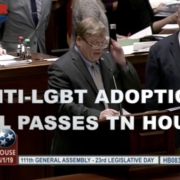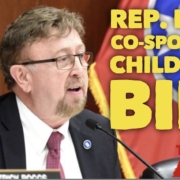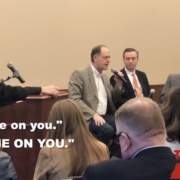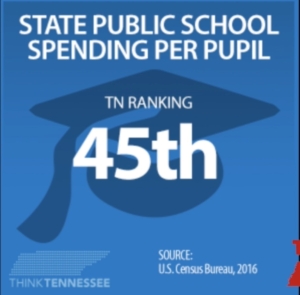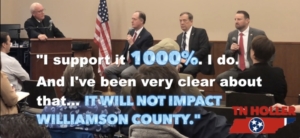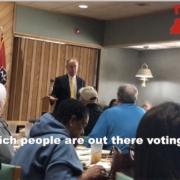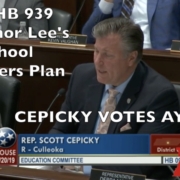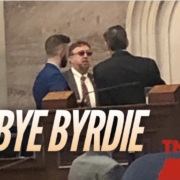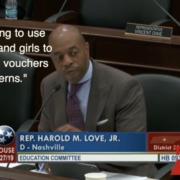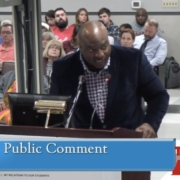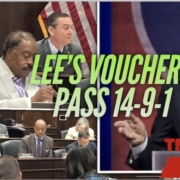Anti-LGBTQ Adoption “License to Discriminate” Bill Passes TN House
A proposal to allow agencies to deny service to LGBTQ Tennesseans seeking to adopt a child passed the House of Representatives 67-22.
If enacted, House Bill 836 would permit private child-placing agencies to deny any person seeking to foster or adopt a child if the placement would “violate the agency’s written religious or moral convictions.”
Watch the Floor debate highlights HERE:
The bill—sponsored by Rep. Tim Rudd, R-Murfreesboro, District 34, and co-sponsored by Rep. John Ragan, R-Oak Ridge, District 33—passed the full House on April 1.
Democrats Rep. Bo Mitchell and Rep. John Ray Clemmons spoke out in opposition to the bill, questioning why we would deny any loving family the right to adopt if they so desired in light of the fact that 8000 children are currently in need of homes.
Mitchell questioned whether Jews could be denied adoption by certain agencies, to which Rudd responded:
“I have no idea.”
Mitchell said we’re on a “slippery slope”, and Clemmons said “we have gone too far” when it comes to discrimination.
Rep. Jeremy Faison was the loudest Republican in support, attempting to seize the mantle of “tolerance” and saying that “liberals” should be willing to extend the same tolerance to the intolerance of those agencies.
The question becomes: Is tolerance of intolerance actually tolerance? Or is it more intolerance? Is in “intolerant” to not want to “tolerate” bullying? Where do we draw that line?
The Tennessee Equality Project says the bill allows agencies to discriminate because LGBTQ citizens are not a “protected class” under federal law.
There are more than 8,000 children in the care of the Department of Children Services. The department works with a network of adoption agencies to find foster care and permanent homes for the children in state custody. Under the rules of the bill, DCS could not deny an agency’s license or service contract for discriminatory practices against LGBTQ families.
NOTE: JOHN MARK WINDLE WAS THE ONLY DEMOCRAT TO VOTE IN FAVOR.
How they voted: House Bill 836
Representatives voting to allow adoption agencies to deny adoptions to LGBTQ Tennesseans for “religious or moral” reasons:
Rep. Charlie Baum, R-Murfreesboro, District 37
Rep. Clark Boyd, R-Lebanon, District 46
Rep. Rush Bricken, R-Tullahoma, District 47
Rep. David Byrd, R-Waynesboro, District 71
Rep. Kent Calfee, R-Kingston, District 32
Rep. Dale Carr, R-Sevierville, District 12
Rep. Mike Carter, R-Ooltewah, District 29
Rep. Scott Cepicky, R-Culleoka, District 64
Rep. Mark Cochran, R-Englewood, District 23
Rep. Jim Coley, R-Bartlett, District 97
Rep. Michael Curcio, R-Dickson, District 69
Rep. Martin Daniel, R-Knoxville, District 18
Rep. Bill Dunn, R-Knoxville, District 16
Rep. Rick Eldridge, R-Morristown, District 10
Rep. Jeremy Faison, R-Cosby, District 11
Rep. Andrew Farmer, R-Sevierville, District 17
Rep. Ron Gant, R-Rossville, District 94
Rep. Johnny Garrett, R-Goodlettsville, District 45
Rep. Bruce Griffey, R-Paris, District 75
Rep. Curtis Halford, R-Dyer, District 79
Rep. Mark Hall, R-Cleveland, District 24
Rep. Kirk Haston, R-Lobelville, District 72
Rep. David Hawk, R-Greeneville, District 5
Rep. Patsy Hazelwood, R-Signal Mountain, District 27
Rep. Esther Helton, R-East Ridge, District 30
Rep. Gary Hicks, R-Rogersville, District 9
Rep. Matthew Hill, R-Jonesborough, District 7
Rep. Timothy Hill, R-Blountville, District 3
Rep. Andy Holt, R-Dresden, District 76
Rep. Dan Howell, R-Cleveland, District 22
Rep. Bud Hulsey, R-Kingsport, District 2
Rep. Chris Hurt, R-Halls, District 82
Rep. Curtis Johnson, R-Clarksville, District 68
Rep. Kelly Keisling, R-Byrdstown, District 38
Rep. Sabi Kumar, R-Springfield, District 66
Rep. Justin Lafferty, R-Knoxville, District 89
Rep. William Lamberth, R-Portland, District 44
Rep. Tom Leatherwood, R-Arlington, District 99
Rep. Mary Littleton, R-Dickson, District 78
Rep. Susan Lynn, R-Mt. Juliet, District 57
Rep. Pat Marsh, R-Shelbyville, District 62
Rep. Debra Moody, R-Covington, District 81
Rep. Jerome Moon, R-Maryville, District 8
Rep. Brandon Ogles, R-Franklin, District 61
Rep. Dennis Powers, R-Jacksboro, District 36
Rep. John Ragan, R-Oak Ridge, District 33
Rep. Bob Ramsey, R-Maryville, District 20
Rep. Jay Reedy, R-Erin, District 74
Rep. Tim Rudd, R-Murfreesboro, District 34
Rep. Lowell Russell, R-Vonore, District 21
Rep. Bill Sanderson, R-Kenton, District 77
Rep. Jerry Sexton, R-Bean Station, District 35
Rep. Paul Sherrell, R-Sparta, District 43
Rep. Robin Smith, R-Hixson, District 26
Rep. Mike Sparks, R-Smyrna, District 49
Rep. Bryan Terry, R-Murfreesboro, District 48
Rep. Rick Tillis, R-Lewisberg, District 92
Rep. Chris Todd, R-Jackson, District 73
Rep. Ron Travis, R-Dayton, District 31
Rep. James “Micah” Van Huss, R-Gray, District 6
Rep. Terri Lynn Weaver, R-Lancaster, District 40
Rep. Mark White, R-Memphis, District 83
Rep. Ryan Williams, R-Cookeville, District 42
Rep. Dave Wright, R-Corryton, District 19
Rep. Jason Zachary, R-Knoxville, District 14
Speaker Glen Casada, R-Franklin, District 63
Rep. John Mark Windle, D-Livingston, District 41
Representatives voting No against the bill:
Rep. Bill Beck, D-Nashville, District 51
Rep. Karen Camper, D-Memphis, District 87
Rep. Jesse Chism, D-Memphis, District 85
Rep. John Ray Clemmons, D-Nashville, District 55
Rep. Barbara Cooper, D-Memphis, District 86
Rep. Vincent Dixie, D-Nashville, District 54
Rep. Bob Freeman, D-Nashville, District 56
Rep. Yusuf Hakeem, D-Chattanooga, District 28
Rep. G. A. Hardaway, D-Memphis, District 93
Rep. Jason Hodges, D-Clarksville, District 67
Rep. Darren Jernigan, D-Old Hickory, District 60
Rep. Gloria Johnson, D-Knoxville, District 13
Rep. London Lamar, D-Memphis, District 91
Rep. Harold Love, Jr., D-Nashville, District 58
Rep. Larry Miller, D-Memphis, District 88
Rep. Bo Mitchell, D-Nashville, District 50
Rep. Antonio Parkinson, D-Memphis, District 98
Rep. Jason Potts, D-Nashville, District 59
Rep. Jason Powell, D-Nashville, District 53
Rep. Johnny Shaw, D-Bolivar, District 80
Rep. Rick Staples, D-Knoxville, District 15
Rep. Joe Towns, Jr., D-Memphis, District 84
Representatives Present, Not Voting
Rep. Clay Doggett, R-Pulaski, District 70
Rep. Iris Rudder, R-Winchester, District 39
Rep. Dwayne Thompson, D-Cordova, District 96
Absent or Missed Vote:
Rep. John Crawford, R-Kingsport, District 1
Rep. John Holsclaw, Jr., R-Elizabethton, District 4
Rep. Cameron Sexton, R-Crossville, District 25
Rep. Kevin Vaughan, R-Collierville, District 95
Rep. Sam Whitson, R-Franklin, District 65
Rep. John DeBerry, D-Memphis, District 90
Rep. Mike Stewart, D-Nashville, District 52

